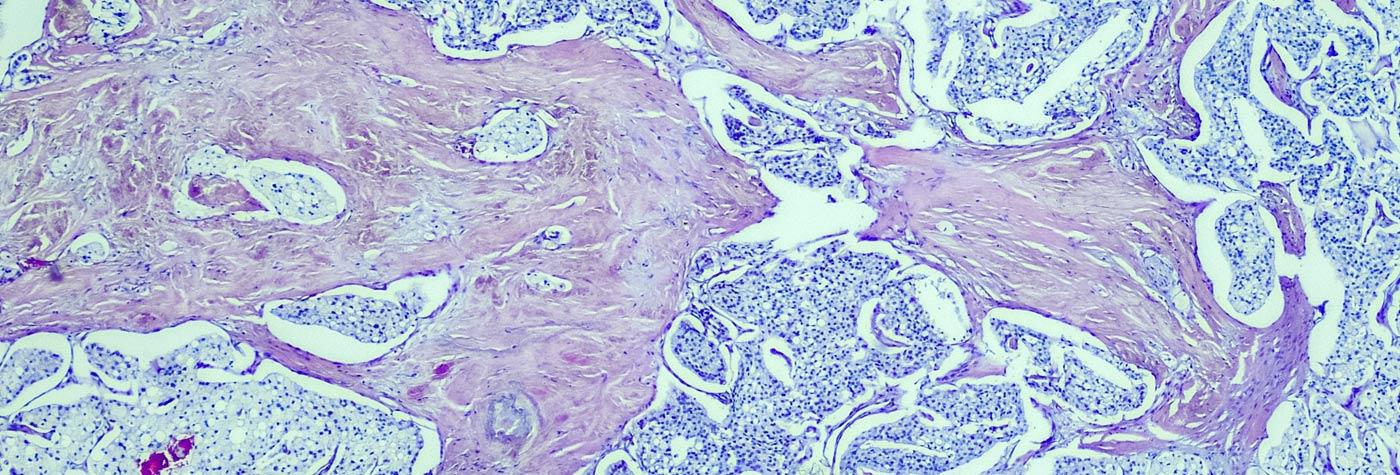Radiopharmaceutical Treatments
The Markey Cancer Center is one of few hospitals in Kentucky offering radiopharmaceutical treatment for neuroendocrine tumors and some cancers. Radiopharmaceuticals are radioactive medicines that seek and destroy cancer cells with few side effects. These drugs offer significantly improved quality of life and more prolonged survival than standard treatments.
What are radiopharmaceuticals?
Radiopharmaceuticals deliver radiation therapy directly to cancer cells while decreasing the radiation exposure to healthy cells. Doctors use radiopharmaceuticals to treat people who may not have responded well to other cancer treatments. These drugs are specially designed to find and latch onto cancer cells. The radioactive medicine then damages the DNA of the cancer cells and kills them.
Peptide receptor radionuclide therapy (PRRT) is a type of radiopharmaceutical used for neuroendocrine tumors. PRRT can control advanced neuroendocrine tumors, shrink tumors and relieve symptoms.
Cancers we treat with radiopharmaceuticals
Radiopharmaceuticals are approved by the U.S. Food and Drug Administration (FDA) to treat adults over 18 with metastatic neuroendocrine tumors (NETs) and prostate cancer. Metastatic means cancer has spread to other parts of the body. Researchers are also conducting clinical trials to see if radiopharmaceuticals work for breast, colon, head and neck, lung, pancreatic and other cancers.
The FDA has approved one radiopharmaceutical drug for children with neuroendocrine tumors. The Markey Cancer Center is one of a handful of U.S. hospitals offering radiopharmaceutical clinical trials for children. These trials treat children with rare cancers, including pediatric neuroendocrine tumors, paraganglioma, pheochromocytoma and neuroblastoma.
What to expect during treatment
- PET scan: Not all cancers respond to radiopharmaceuticals. A specialized positron emission tomography (PET) imaging scan can determine if you have the type of cancer that may benefit from this treatment.
- Blood work: We check your blood counts and liver and kidney function to ensure your body can handle the treatment.
- IV treatment: The number and schedule of treatments depend on the type of drug you receive. Radionuclide therapy is typically given through an IV (intravenous therapy) every two months with a total of four doses. You receive the IV therapy at the hospital and can go home the same day.
- Limited side effects: Most people do not experience side effects. This is because radiopharmaceuticals specifically target cancer cells while sparing healthy tissue. A small number of people experience nausea, vomiting or liver damage. In rare cases, some people may develop leukemia or bone marrow disease several years after treatment.
Why choose Markey Cancer Center?
Patients from all over Kentucky and beyond come to the Markey Cancer Center for radiopharmaceutical treatment. Some of the reasons people choose us include:
- Expertise: We are nationwide leaders in this specialized cancer treatment. Ours is the only program in Kentucky offering radiopharmaceutical cancer treatment and clinical trials for neuroendocrine tumors.
- Team approach: Our team includes specialists in oncology, nuclear medicine, radiation oncology, cancer surgery, radiology and pathology. We work together to develop your unique treatment plan.
- Nationally ranked care: Markey is the only NCI-designated comprehensive cancer center in Kentucky. We’re also consistently ranked among the top 50 cancer centers in the nation by U.S. News & World Report.
Clinical trial leaders
The Markey Cancer Center received funding from the National Cancer Institute (NCI) to lead two national clinical trials testing improvements to radiopharmaceutical treatment. These NCI trials study radiation sensitizers, making tumors respond better to radiation treatment.
We are also researching ways to improve the use of radiopharmaceuticals to treat a variety of cancers. Studies underway at Markey are looking at:
- Ways to increase the effectiveness of radiopharmaceuticals
- Medicines to help with side effects of cancer and radiopharmaceutical treatment
- Which cancers respond to radiopharmaceuticals






